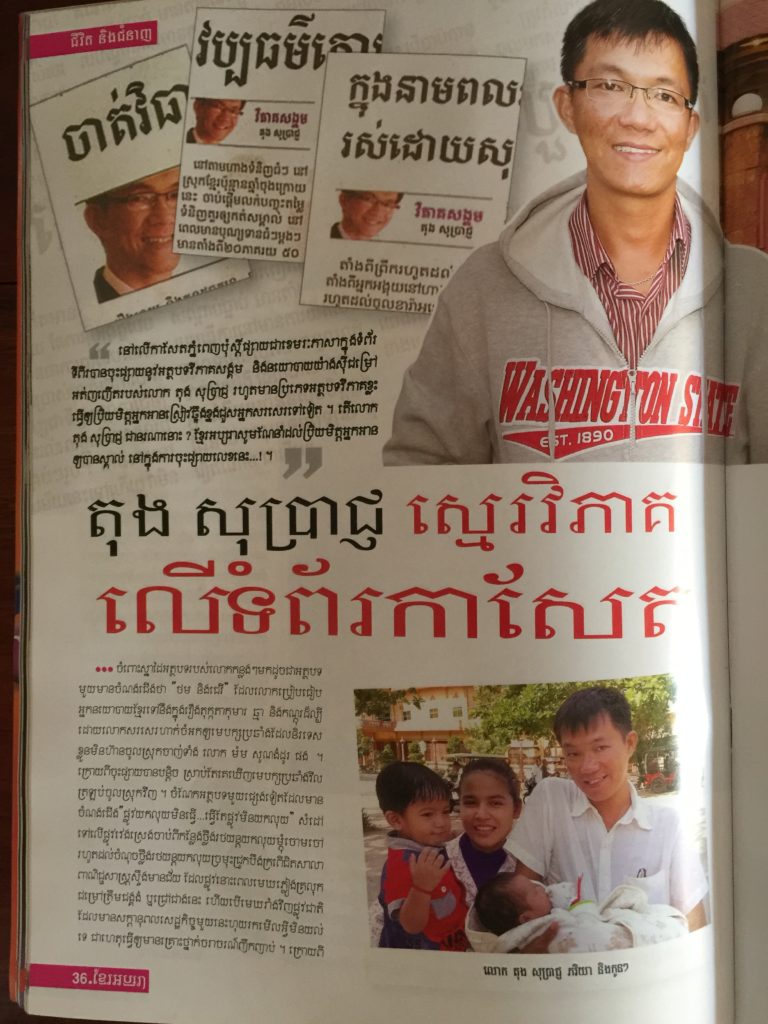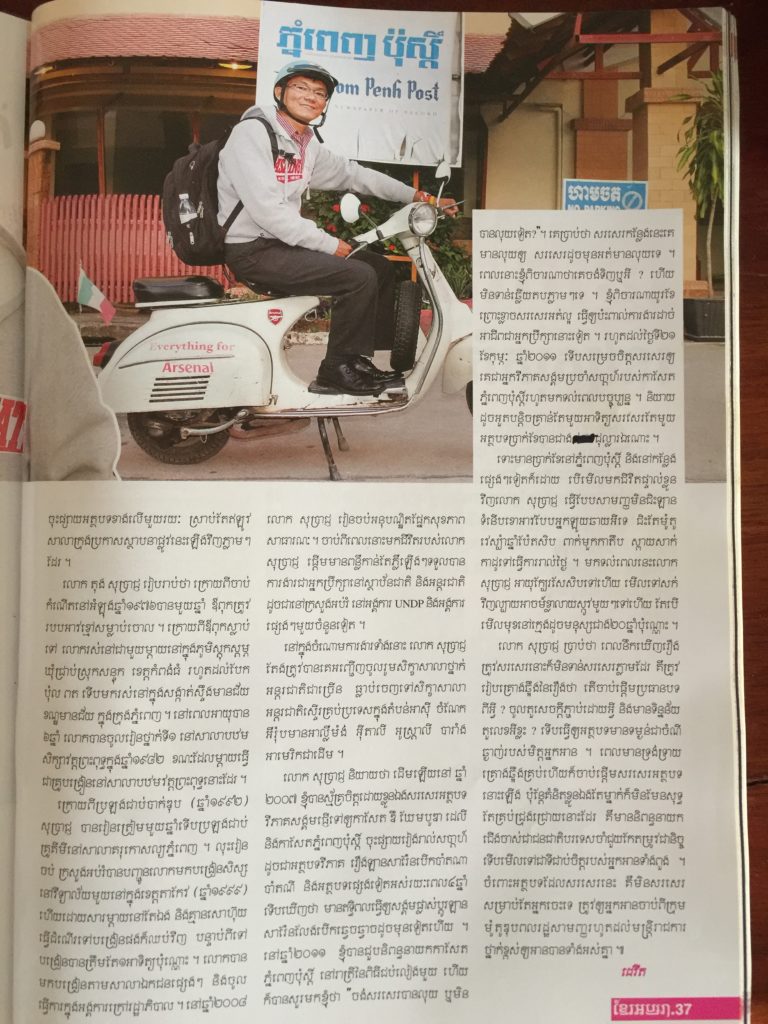Unofficial Translation from APSARA Khmer Magazine/khmer79.com
25 DECEMBER 2013,
VEN CHHUNHEAT
Translated by Taing Rinith
ជីវិតសាមញ្ញលោកតុង សុប្រាជ្ញ អ្នកវិភាគសង្គមដ៏ស៊ីជម្រៅ

Anyone in Cambodia, no matter it is the ordinary person, the motor-taxi driver, the government official or the politician, must familiar with the name “Tong Soprach”. This name belongs to a social-affairs columnist who is prominent for his analytical articles weekly published in the Phnom Penh Post’s Khmer Edition.
Some of his successful works include “Does Sam Rainsy choose to follow the footstep of Lenin or Mandela?” in which he compares the Cambodian politicians to Tom & Jerry, who fight and take turn to defeat each other in the famous “Tom and Jerry” cartoon. As depicted in the article, Soprach seemed to be making fun of the opposition party leader for his self-exile, saying that he was copying Lenin and therefore, might find less chance to become the prime minister. Yet, not so long after the publication of the article, he returned to Cambodia two weeks before national election on July 28, 2013, bringing joy to all his advocates.
Before national election 2013, Prime Minister Hun Sen reacted to his column saying: “The Phnom Penh Post said correctly on the article on Cambodia should create ethic and language standards of public speaking for politician leaders”. At that time, the Premier wanted to produce the law.

In “Build only the non-toll road, not the toll road”, another similar article, Soprach referred to Veng Sreng Street which was seriously damaged, particularly from the toll in Choam Chao to the toll near The National Institute of Business in Steung Meanchey. The damages made it hard for the daily travelers and frequently caused traffic accidences, especially when it was and after raining. A short time after the article was published, the Phnom Penh Municipality crabbed the road back, removed the toll and declared the reparation of the road.
Nonetheless, some of his articles have not been responded yet, for example, the one about HE, Dr. Cheam Yeab, a senior parliamentarian, who a person to dead in a traffic accident and became a “Hit-and-run Doctor”. In another renowned article under the title “Please do not confused the real PhD with A Doctor of Philosophy to nominated honor doctor who distributes the gifts to the poor”, Soprach criticized some of the honored doctor holders, who nominated only the certificates but not ability.
That should be all for his achievement. However, it is almost unbelievable for a man, who lives a very simple life, could write so many accomplished analytical articles. While we were waiting for Soprach for his interview, we saw he approach to us, riding his 60s Vespa scooter. We had not taken notice of him as we thought that he was a student who had just left the campus, and we was so surprised to find out that it was really him.
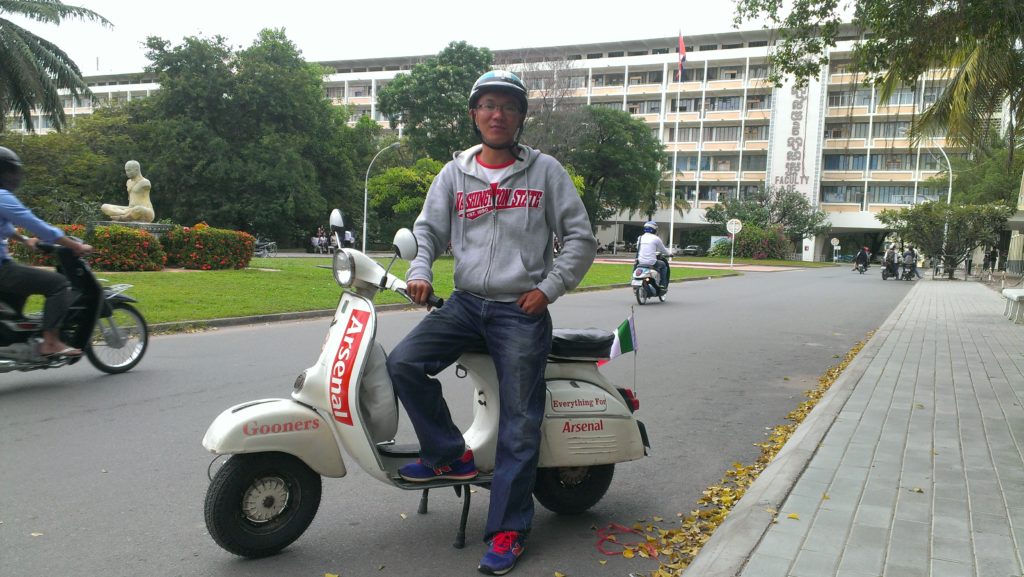
In a small, quiet café, Soprach, sipping his cup of black coffee, told us all about his life and his family background without any hidden information. He was born fatherless in 1976, as his father had been killed by a Khmer Rouge cadre. Chou Tong was Soprach’s father’s name, and he was a former lieutenant in Lon Nol Regime. After the death of his father, Soprach lived with his widowed mother, whose name is Siev Khim, in Sdok Sdom village, Chroab commune, Santouk district, Kampong Thom province. Not until the end of Pol Pot Regime that they moved to Phnom Penh for his mother wanted young Soprach to gain access to higher education. Mrs. Siev Khim chose not to marry again because she was afraid that her son would suffer from domestic violence (by her new husband, of course).
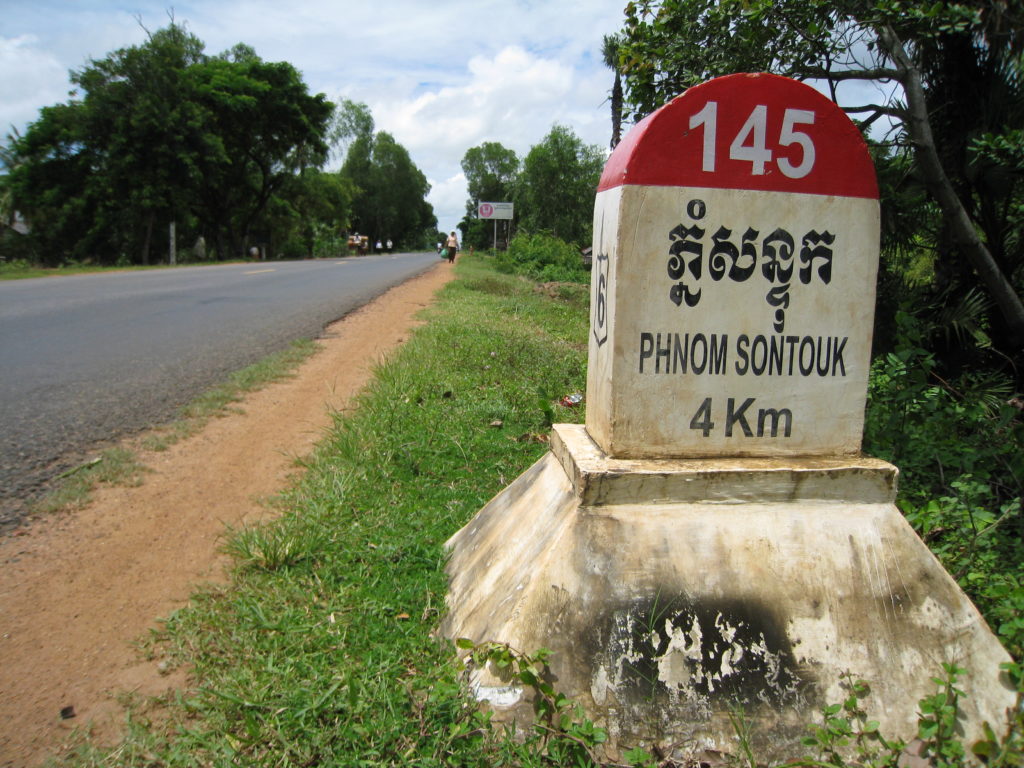
In 1982, six-year-old Soprach signed up for primary education in Wat Preah Puth primary school. His mother, who was a teacher, always told him that, “If you want to improve your skill in Khmer literature and writing, you have read a lot of newspapers.” However, he would reply, “I would play and go for a walk rather than read all those meaningless or poor quality newspapers at that time.”
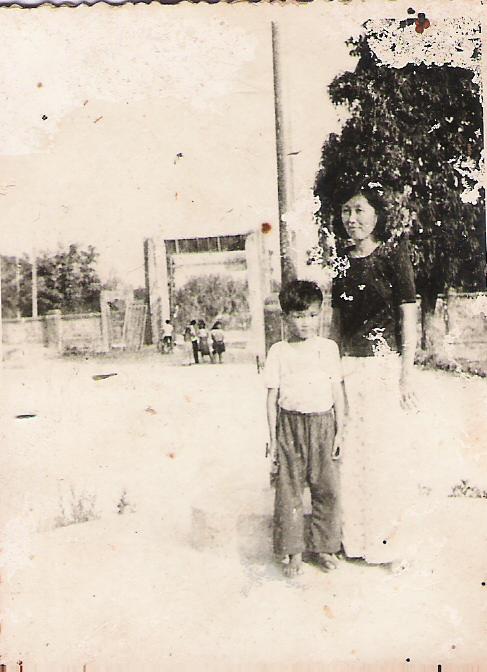

In 1986, Soprach went to Bak Touk high school for secondary education, and sat the school-leaving exam (Bac. II) in 1992. Noticeably, Soprach was good at almost all the subjects in the curriculum, except philosophy subject, which he sometimes failed because it was abstract science. In spite of that, the firm academic foundation had made him an out-standing student. He received higher grade in his Bac. II exam, which was very rare at that time.
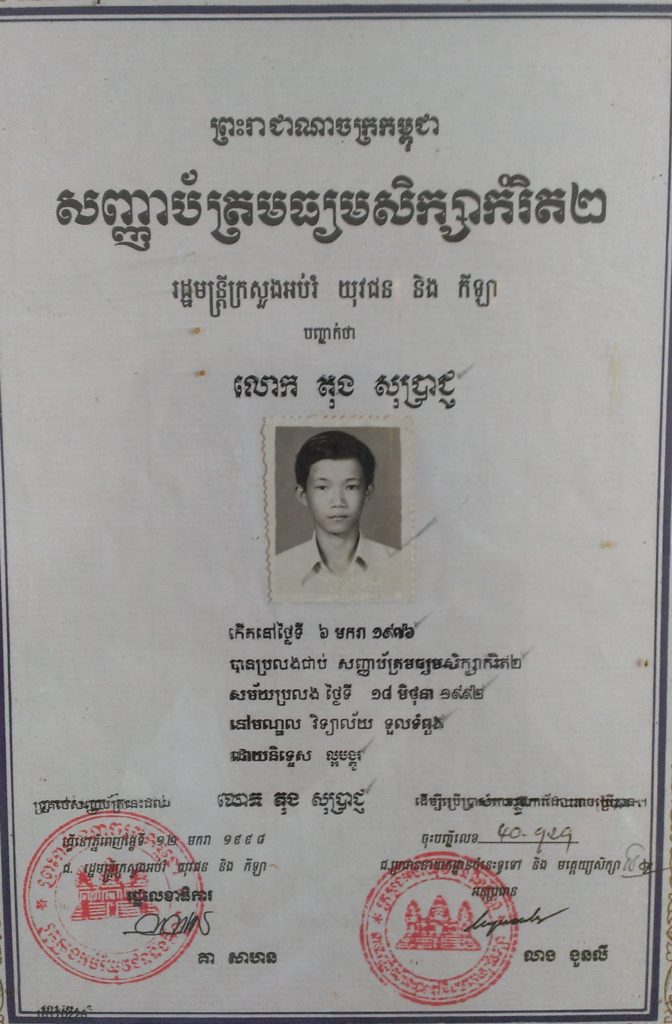
Like mother, like son; Soprach wanted to be an educator, just like his mother. He was awarded the scholarship to study in Royal University of Phnom Penh, Majoring in Chemistry. After Graduation, he successfully enrolled in the Institute of Pedagogy (now National Institute of Education), and then became a teacher of chemistry. The Ministry of Education, Youths and Sports appointed him to Bati High School in Takeo Province. After a week of teaching, he resigned as the result of financial problem, and also to take care of his mother, who was alone in Phnom Penh.
Unemployment entered his life; he could not find a job while all of his friends did. Soprach was humiliated and mocked by people. Yet, he was still cheerful and hopeful, believing in his ability and firm academic foundation. Yet, that was not for long; Soprach soon found some part-time job, and enjoyed doing them despite the low pays. In 2001, he became a full-time employee of GAD/C (Gender and Development for Cambodia), and then CARE International.
Because he did not like the complex supervision in the decent job, Soprach quitted his job in 2006, and start working as the freelance consultant until now. Being in that job for a while, Soprach spent the next two years studying at the University of Cambodia (UC) for a master degree in Public Health, which he received in 2008.
As his living standard and knowledge were improved, he was offered many job opportunities by NGOs, INGOs, the United Nations, and many other governmental institutes. Some of his important works include nearly 20 research reports which have been already published. The most well-known among them are the ones about “Gang Rape in Phnom Penh” and “Valentine’s Day of Sexual Relationships among Young People”.
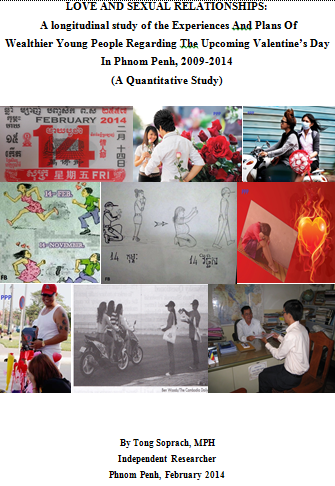
In his job, Soprach has received several invitations to participate in many conferences in almost all the countries in Southeast Asia and some Asian countries. He has also been on some field trips to the United States, Germany, Italy, France, England, Scotland, Sweden and so on. Moreover, in the recent years, Soprach has participated in the annual ASEAN Youth Leadership Conference.
Although he did not go abroad for tertiary education, he has taken some of the training courses at both ASEAN and international levels. These activities have given Soprach useful experience and knowledge, which enables him to make a social young analyst out of himself unconsciously.
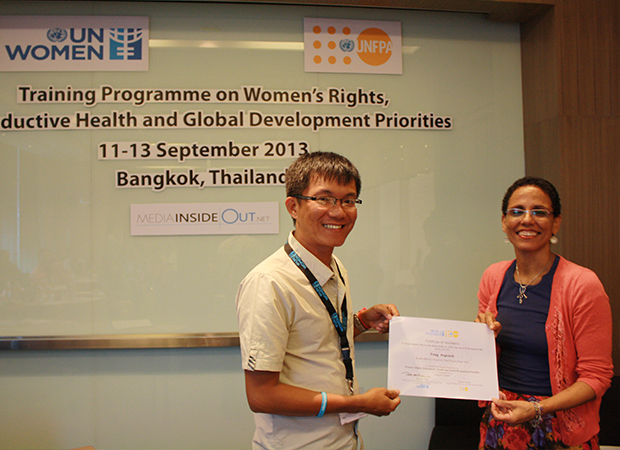
It may be too hard to believe that a man, who was very bad at philosophy in his school years and had never taken any course about media or news, could become such an accomplished and impressive analyst. The readers highly value his work and will not stop reading his articles until they are finished each column. Nonetheless, Soprach added that his ability was not born with him or handed to him by his family. He bases all his works on critical thinking, from his learning of French language and quantitative and qualitative researches, along well as what he has learned from his family, his teachers, his readers and his travels.
Furthermore, he can use numbers to write as interpretation of the data which can form complete words. Soprach always tries to trace any change in the society through chatting and media. When he writes about and analyses any topic, his only purpose is to pursue policy change and behavior change positively. His working principle is “What you do is more crucial than you know or say.”
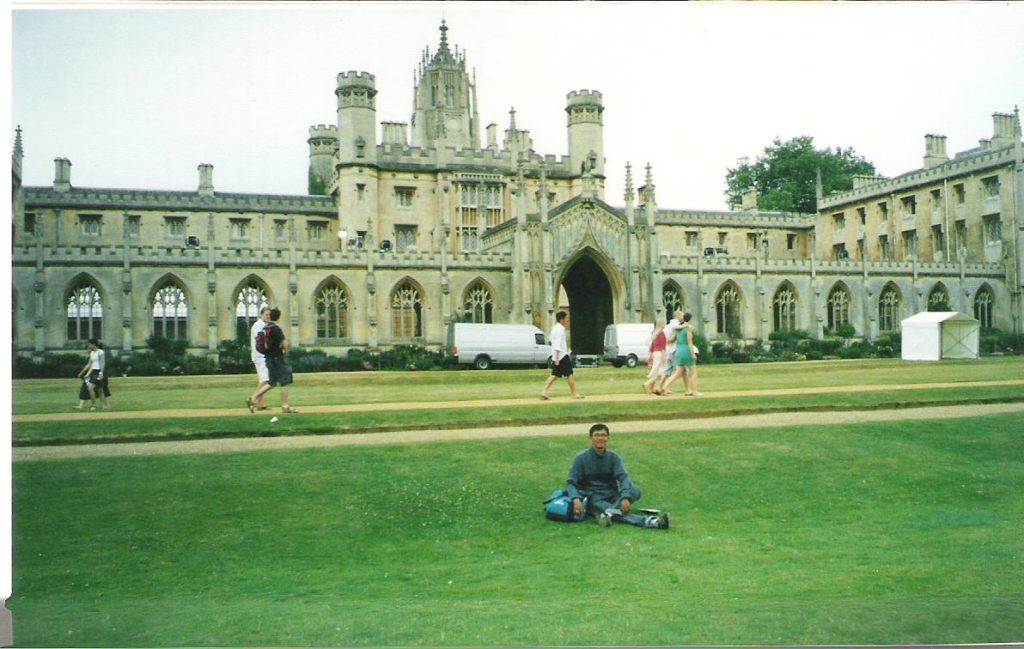
With his wit and lively gesture, Soprach, drinking his coffee, told us about his relationship with his mother. He likes to tease her mother, saying that, “You are always impressed by Sin Sisamouth, who composed the songs about anywhere he had been while your son can write about anywhere he has been. You are also admirer of Soth Bolin, a famous journalist during the period of Sangkom Reastr Niyom. Now, your son is not bad either. The only difference between us is the time in which we are in.”
However, his excellent writing skill was not coincidentally given to him. Starting from 2007, he would write a lot of letters to the editor in English version to the Cambodia Daily and the Phnom Penh Post, most of which were published. They were about a wide range of topics, but the most successful ones were those about the loud and careless noises of sirens: “Abuse of license plates not restricted to RCAF”. After continual publication, there was no more careless, annoying siren noise in Phnom Penh.
In 2009, he met Ross Dunkley, the Former Publisher of The Phnom Penh Post at a party. He told Soprach whether he wants to write the column for The Phnom Penh Post for some cash instead of the non-paying letter to the editor. Soprach was sure that the editor was willing to pay for his works, but he did not give his answer at once.

He spent months considering since he was afraid that his writing, in case he did not do a good job, could affect his job as the freelance consultant. Not until 21st February, 2011 did he agreed to the request and begin the career as a social-affairs columnist. Soprach confirmed that he was not a powerful man but an influential man in the society; therefore, he must be rigorous in his writing as any mistake he makes will pass the wrong message, and thus affect people.
Although he earn much from all his works for The Phnom Penh Post and many other places, he still lives a very ordinary life; he goes to work with normal clothes and a backpack, riding his 60s Vespa accompanied by his small cape helmet.
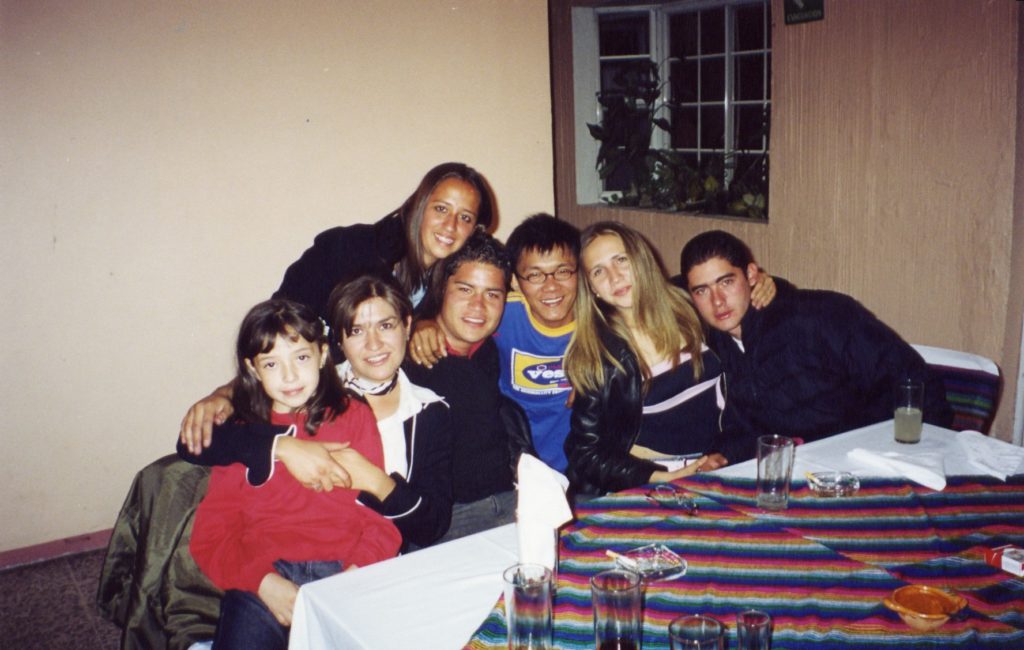
Unconsciously, Soprach is nearly in his 40s. His hair is getting grey, but his face makes him look around 20 years younger. Not every journalist can be a social columnist; analytical writing requires innovative ideas and thoughts. Each of the topics demands the writer to do researches, and researching skill, which Soprach has mastered, is indispensable for social analyst.
In addition, he has also devised a tool to limit the theme and meaning of his writing. “It takes only five minute for readers to finish reading my article while I spend three or four months to think of ideas and collect all the related information from newspaper and other media before writing it.” Said Soprach, laughing.
Even after he has collected all the materials needed for writing, he still cannont write his article right away. He has to prepare the outline for his writing to make sure that his work consists of all the components and statistics that can attract the readers. Next, he starts to writing, using what he had prepared; yet using only his own ideas is not enough.
He needs to discuss with the Editor-in-Chief or Managing Editor in order to ensure that his article will appeal to readers and reflect the reality in the society. He always attempts to balance the ideas in his work to avoid overestimation or underestimation. His works are written not only for scholars such as governmental officials but also for the low-educated people.
In spite of the fact that his articles comprise what we call “criticism for improvement”, he has often criticized for political bias and perjury; that is, he gains no support from any political party. Some of the readers doubt his knowledge and critical thinking skill. As the matter of fact, Soprach has never intended to be a politician or a representative because all politicians look a little scary to him.
Soprach prefers being an ordinary citizen and helping to improve the society. Still, he accepts that most of his columns are not yet interesting to youths, as they prefer reading about scandals rather than society matter.

In contrast to the local folks in the past, Soprach never tries to conceal what he knows and has learned. In fact, he even wants to tell people more than what he knows, so that all of them would help to develop the country. He claims that hiding one’s knowledge from the others will only reduce the quality of the overall ability and skill. Beside of writing, he always shares his knowledge to public through guest-speaker.
Eventually, Soprach recognizes that he is an important person in the society, but he never wants to emigrate to any oversea. Since his birth, he has struggled and works so hard that he could become whom he is today. Accordingly, he has no reason to leave his motherland. There are not many like Tong Soprach in Cambodia. He observes: “Many Cambodian people like talking and watching but very rare professional writing”.

For family life, Mr. Soprach has been married to Mrs. Ngauy Chanthy since 2010, a freelance make-up artist and hairdresser. The couple has had two lovely children: a son and a daughter, who became the strong bond of their happy married life.

——————————————————————————————————-
REFERENCE: The cover of the Magazine, published on December 25 2013


